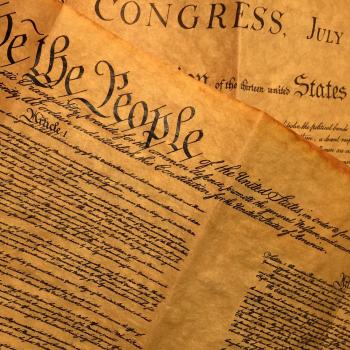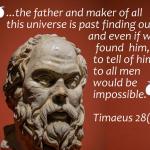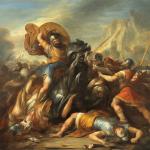2 And when the Lord thy God shall deliver them before thee; thou shalt smite them, and utterly destroy them; thou shalt make no covenant with them, nor shew mercy unto them:3 Neither shalt thou make marriages with them; thy daughter thou shalt not give unto his son, nor his daughter shalt thou take unto thy son.4 For they will turn away thy son from following me, that they may serve other gods: so will the anger of the Lord be kindled against you, and destroy thee suddenly.5 But thus shall ye deal with them; ye shall destroy their altars, and break down their images, and cut down their groves, and burn their graven images with fire. –Deuteronomy 7: 2-5 KJV
40 So Joshua smote all the country of the hills, and of the south, and of the vale, and of the springs, and all their kings: he left none remaining, but utterly destroyed all that breathed, as the Lord God of Israel commanded.-Joshua 10:40 KJV
16 Behold, these caused the children of Israel, through the counsel of Balaam, to commit trespass against the Lord in the matter of Peor, and there was a plague among the congregation of the Lord.17 Now therefore kill every male among the little ones, and kill every woman that hath known man by lying with him.18 But all the women children, that have not known a man by lying with him, keep alive for yourselves. –Numbers 31:16-18 KJV.
What do these Hebrew Bible passages mean?
If we ask a typical fundamentalist Christian (or, I suspect, the average casual Christian) whether the God of Abraham and Jesus ordered his chosen people to commit genocide, including the slaughter of children and “suckling infants,” they would give on of two answers:
- “Of course not. God is all about love!”
- “If he did, he had a good reason.”
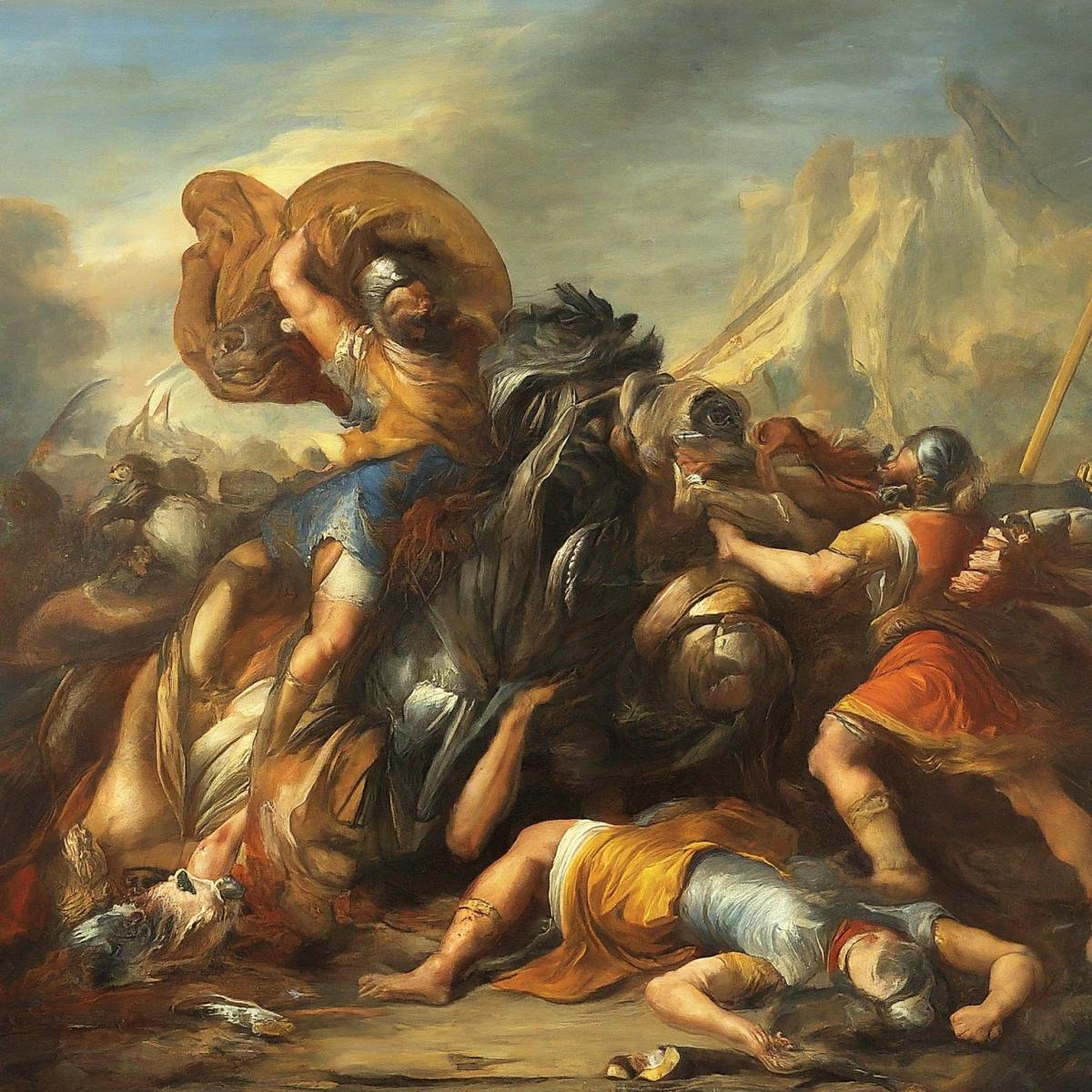
Do we have any evidence for our beliefs?
Oftentimes today we hear that the Bible says or does not say a certain thing. One of the concepts that frequently produces controversy when discussing the Hebrew Bible is whether or not Adonai (I am using the substitute for the Tetragrammaton and personal pronouns for this deity are in non-binary form) ordered their children, the Israelites, to kill the other people around them.
Many authors have written about this particular topic and for the purposes of this article we will review a few of the things that have previously been written and we will introduce some ideas that have evolved from studying those sources.
The concept that we are considering is the concept that has been called “genocide” in our time but that particular description may or may not be appropriate when dealing with ancient manuscripts such as the Hebrew Bible.
If this were a scholarly paper, we would spend some time and effort defining what we mean by genocide. For the casual reader and for the student of biblical scholarship who is willing to accept a reasonable definition and not require pages and pages of elucidation, we will adopt a general definition that will meet the needs of this paper:
For the purposes of this discussion we are defining genocide as any action by a state or by a state agent or by a deity or by a deity’s agent that causes the death and destruction of a group of people based on such kinds of descriptions as national, racial or ethnic identity.
Are there modern examples of genocide?
Examples of genocides and attempted genocides in modern times include the Nazis of Germany in the 1940s, who attempted the genocide of the Jewish people as well as the attempt in current times by the Chinese government to eliminate a specific group of Muslims from within the borders of China. Sadaam Hussein in Iraq slaughtered almost an entire population of people known as “Marsh Arabs” within his own country.
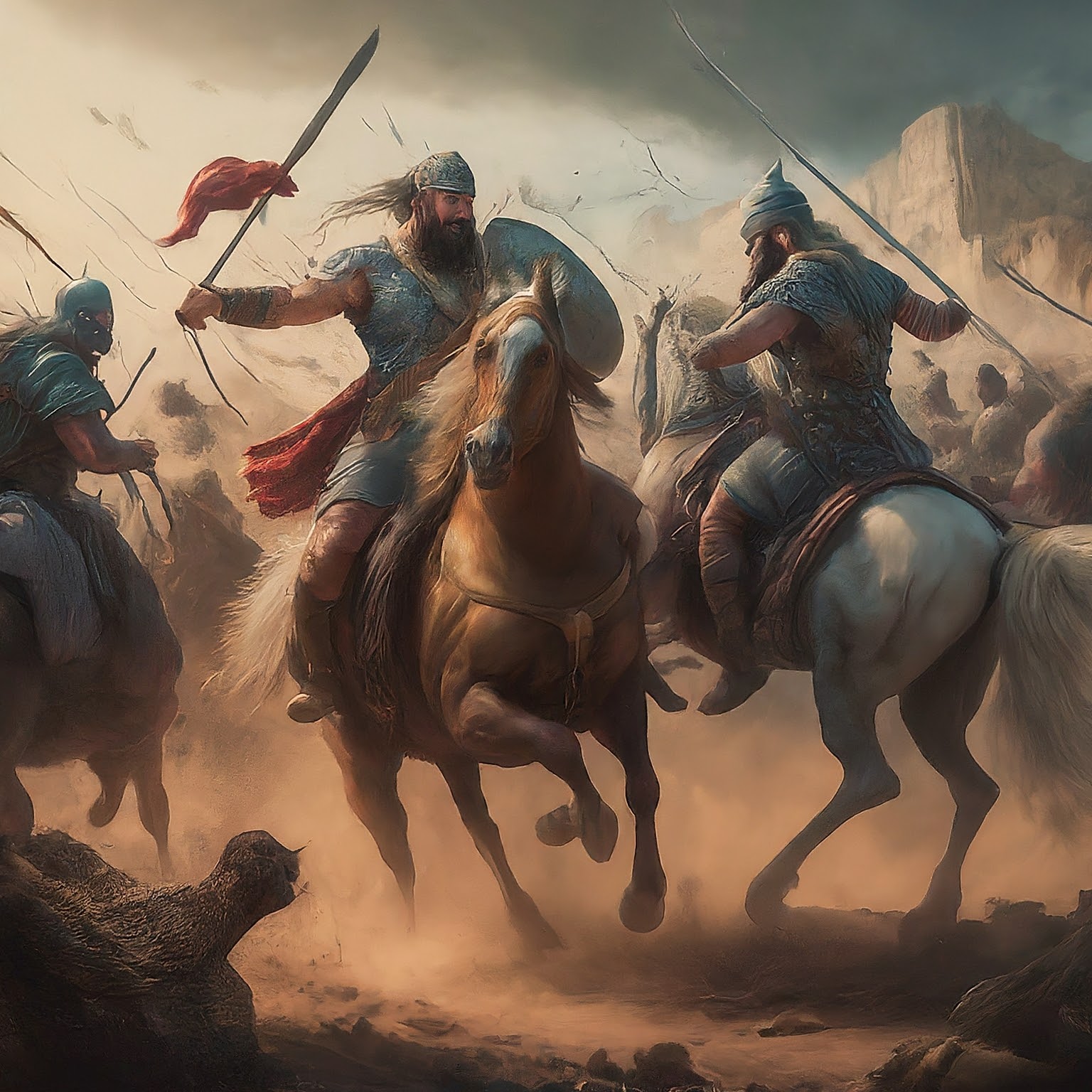
What about Biblical times?
In ancient times and in literature produced in ancient times it is not unusual for groups of people in their desire for conquest to attempt to destroy other groups of people who are in their way or who are in possession of the land that they wish to occupy. In some cases these genocides have occurred because of a direct desire on the part of the aggressor to eliminate people because of who they are. In other cases genocides have occurred in ancient times for the purposes of acquiring land and territory and the genocide that occurred did not have anything directly to do with ethnicity race or nationality beyond the acquisition of land desired by the aggressor.
What kinds of questions should we be asking?
In order to understand the concept of genocide as related in the text of the Hebrew Bible we need to ask certain specific questions which will allow us to organize and elucidate the complex ideas contained in the theology, history and literature of the ancient Hebrew people.
- Do we find evidence of genocide occurring in the Hebrew Bible?
- If we find evidence of genocide, to whom can we ascribe these actions?
- If one group has committed genocide against another group where did the idea come from?
- Is there evidence in the text of the Hebrew Bible that would support the idea that Adonai ordered genocide of Israel’s enemies?
- If Adonai ordered genocide within the text of the Hebrew Bible, can we speculate as to the possible rationalization of these acts?
Do we find evidence of genocide in the Hebrew Bible?
Noah and the flood. (Genocide example #1)
In the book of Genesis, beginning with chapter 6, we find the well known story of Noah and the flood.
In this first example of genocide reported in the Hebrew Bible, the genocide is not ordered by Adonai but is carried out by them.
In the canonical biblical account, Adonai decides that his creation of mankind was a mistake and that the people he created were not keeping his world in the manner that he believed that they should be. He decided therefore to destroy all of the people on the earth with the exception of one man and his family. That man’s name was Noah. Noah was seen by the author of Genesis as a quite “godly” man and was chosen by Adonai to build an ark in order to enable Noah and his family and breeding pairs, at least, of all the animals of the earth to be saved from the upcoming deluge.
As the story proceeds Noah builds the ark as instructed by Adonai and gathers the animals together with his family and they spend 40 days and nights in the ark as the rains and the waters from beneath the earth cover the earth with water killing all the living things other than those things that are safe within the ark.
After the rains and the rising water end and the water begins to subside Noah and his family re-populate the earth. This is the story as far as it is contained within the Book of Genesis: (There is, of course, no mention of the genetic complications of this scenario.).
Authors note: In the Genesis account of the flood there are a number of points of resemblance with other flood narratives that have occurred earlier than the Genesis story, most notably the flood narrative within the epic of Gilgamesh which predates the book of Genesis by some 700 to 1400 years. In addition there is a set of books which were not selected for the final canon of the Hebrew Bible. These books are known as the First, Second and Third Books of Enoch. Enoch was Noah’s great-grandfather and the accounts in the Books of Enoch give different reasons why Adonai found it necessary to kill all of their created humans.
Abraham negotiates with Adonai. (Genocide example #2)
In Genesis, Chapter 18 and 19, we find the story of Sodom and Gomorrah.
In the Biblical account, Adonai informs Abraham, a man they have specifically chosen, that they are going to destroy the cities of Sodom and Gomorrah because of the wickedness of the inhabitants. Abraham begins to question the wisdom of Adonai and asks whether Adonai would destroy the cities if they could find 50 good men (women and children do not count).
Adonai agrees that if 50 can be found, they will spare the cities.
The negotiation continues to 45, to 40, to 35, all the way down to five.
Adonai finally agrees to spare the cities if five good men can be found.
When the time comes, after some sleight-of-hand from a few different players, only one man, Lot, and his two sons-in-law-to-be are found to be good.
Adonai found only three good men in the cities and proceeded, as he had promised Abraham, to “rain sulfur and fire” on the cities until “the smoke of the land went up like the smoke of a furnace.”
Adonai killed all of the inhabitants of the cities, man, woman and child.

The conquest of Canaan. (Genocide example #3)
The descriptions of the conquest of Canaan contained in the Hebrew Bible represent some of the most contradictory, confusing, vexing (and for many, infuriating) passages in the entire Bible. Did the Israelites conquer Canaan all at once? Did they conquer Canaan little by little? Did they settle Canaan peacefully? Were they there all along?
These questions are addressed in the books of the Hebrew Bible but the search for consistent answers will not be readily discernible at all. The accounts of the conquest as presented in the scripture paint a conflicting picture of “total destruction,” tempered by passages that capitulate this idea and speak of gradual conquest and conquest that is far from total.
It is the consensus of scholars that the parts of the Hebrew Bible that describes this supposed conquest were written in the exilic or the post-exilic period (586 BCE – ca. 400 BCE) by the authors of the Deuteronomistic authors of the Hebrew Bible, who are believed by scholars to be responsible for the Books of Deuteronomy, Joshua, Judges, Samuel, and the First and Second Books of Kings.
Scholars agree that the Hebrew Bible contains several different accounts of the conquest of Canaan in several different books, written over many years and written in specific ways for different specific reasons.
We will attempt to make as much sense as possible of these dense and complex texts.
The Israelites leave Egypt and abide in the desert.
At the end of the Book of Exodus, the Israelites leave their bondage in Egypt and spend 40 years wandering in the Sinai desert. The Book of Leviticus is concerned with the proper behavior of the people and the duties and privileges of the priests. The book also contains instructions for worship and the building of the tabernacle.
The Israelites prepare to invade Canaan.
In the next Hebrew Bible book, the Book of Numbers, we learn that Adonai has ordered the Israelites, which have been an amorphous group of men, women and children and now have formed into a formal army with regiments and generals, to send spies into the many parts of Canaan and to learn of the Canaanites’ numbers strength and location.
The spies return a frightening report of strong, giant warriors in Canaan. The people decide they cannot defeat the Canaanites and rebel against Adonai and his prophet, Moses.
Following this, there is intercession by priests; there are offerings, sacrifices and prayers. Adonai orders festivals to be held.
The invasion begins.
In Chapter 6 of the Book of Joshua, we find the account of the Israelite leader, Joshua, defeating the City of Jericho and causing all of the life in it to be “devoted to destruction.”
They devoted the city to the Lord and destroyed with the sword every living thing in it—men and women, young and old, cattle, sheep and donkeys.
Adonai commanded the death of everything, even to the young and old and even to the donkeys.
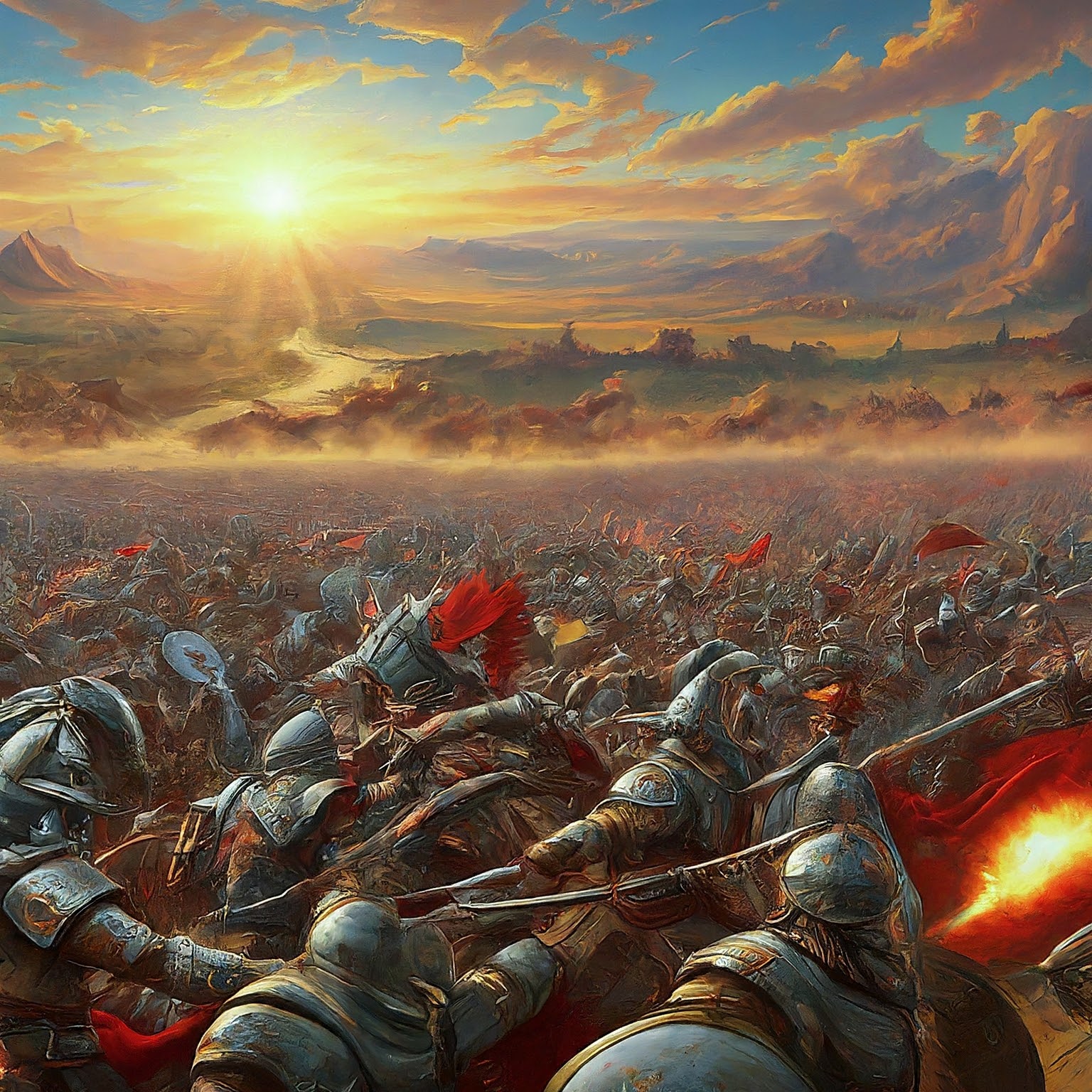
Biblical scholar Daniel McClellan has theorized that the language of the Deuteronomistic authors was chosen specifically to parallel the sacrifices that the Israelites are accustomed to making to their gods throughout their recorded history and in their myths and legends.
He sees this destruction as a ritual cleansing of the land by destroying the wickedness of the Canaanites, drawing parallels with ritual sacrifice elsewhere in the Bible.
Here, he discusses his theory with his associate, Daniel Beecher.
The “conquest” continues.
The Book of Deuteronomy, Chapter 7, as we saw in the introduction to this article, gives an account of the “utter destruction” of seven nations by the Israelite army.
2 And when the Lord thy God shall deliver them before thee; thou shalt smite them, and utterly destroy them; thou shalt make no covenant with them, nor shew mercy unto them:3 Neither shalt thou make marriages with them; thy daughter thou shalt not give unto his son, nor his daughter shalt thou take unto thy son.4 For they will turn away thy son from following me, that they may serve other gods: so will the anger of the Lord be kindled against you, and destroy thee suddenly.5 But thus shall ye deal with them; ye shall destroy their altars, and break down their images, and cut down their groves, and burn their graven images with fire. –Deuteronomy 7: 2-5 KJV
Author’s note: Verse 5, in the King James version states that Adonai ordered the Israelites to “cut down their groves.” It is important to note here that the Deuteronomistic authors were not talking about apple trees.
In the New International version (NIV), verse 5 reads:
5 This is what you are to do to them: Break down their altars, smash their sacred stones, cut down their Asherah poles and burn their idols in the fire.
“Cut down their Ashera poles,” not “cut down their groves.” Scholars believe that the references to Ashera (the divine consort of El and the of Adonai in early traditions) were removed from the King James Bible in order to continue to (erroneously) promote ancient Judaism as a monotheistic religion. Asherah shrines were found throughout Israel and Judah as well as within the Jerusalem temple. We will discuss this topic in a future article.
Later in the Book of Deuteronomy, we learn that the destruction was not as total as Adonai had commanded. Deuteronomy 7:22:
22 The Lord your God will drive out those nations before you, little by little. You will not be allowed to eliminate them all at once, or the wild animals will multiply around you.
“Little by little” does not sound like “total destruction.”
This is capitulation or what Dr. McClellan refers to as “renegotiation of the theology” to make the reality fit the prophecy and the claims.
In the Book of Judges, Chapter 1, the “men of Judah” take possession of part of the Promised Land, but not the part in which the inhabitants have iron chariots. (Judges 1:19-21)
19 The Lord was with the men of Judah. They took possession of the hill country, but they were unable to drive the people from the plains, because they had chariots fitted with iron. 20 As Moses had promised, Hebron was given to Caleb, who drove from it the three sons of Anak. 21 The Benjamites, however, did not drive out the Jebusites, who were living in Jerusalem; to this day the Jebusites live there with the Benjamites.
I believe that the reference to “chariots fitted with iron” might be a literary convention instead of an accurate description. Likewise, the references to “seven nations” and other numberings are literary devices found throughout the literature of ancient times.
The Book of Joshua, Chapter 10, verses 40-42, again describes Joshua’s conquest:
40 So Joshua subdued the whole region, including the hill country, the Negev, the western foothills and the mountain slopes, together with all their kings. He left no survivors. He totally destroyed all who breathed, just as the Lord, the God of Israel, had commanded. 41 Joshua subdued them from Kadesh Barnea to Gaza and from the whole region of Goshen to Gibeon. 42 All these kings and their lands Joshua conquered in one campaign, because the Lord, the God of Israel, fought for Israel.
“He left no survivors. He totally destroyed all who breathed.”
It is not difficult to see that the authors had trouble inventing a glorious past that could be reconciled with the reality of the situation. The Temple had been destroyed and the people scattered and exiled when these accounts were actually written. Writing a conquest narrative in this situation could cause the authors to slip just slightly into a literary genre known as “revenge fantasy.” We will see further examples of this in the prophetic books of the Hebrew Bible and the New Testament in the books of Ezekiel, Isaiah, Daniel, Revelation and others.
In addition, Chapters 13 and 17 of the Book of Joshua describe an incomplete conquest of Canaan.
What can we infer from the conquest narrative?
Taking the text of the Hebrew Bible, we can easily see that in whatever manner the Israelites came to inhabit the Promised land, it became their cultural and religious center and the central location of Adonai worship. As we will see in a future article, the exclusive worship of Adonai in Israel, to the exclusion of the worship of other deities was not nearly as widespread and as imbedded in Israelite culture as the Bible authors might have preferred.
The episodic nature of the accounts, the lack of consistency, the implausibility of some of the stories leads to the conclusion that there was no glorious conquest at all and that these stories were written to invent a “golden age” past for Israel that could be a way for the people of Israel to maintain a national identity or a sense of peoplehood while in a state of exile far from the land of Adonai, from Jerusalem and from their temple.
In fact, the Israelites did not leave bondage in Egypt in numbers anything like the account in Genesis. Millions of Israelites did not wander in the desert for 40 years (another literary convention). There is no archaeological evidence or corroborating written evidence of such a thing.
It is much more likely that the tribes of Israel occupied this land all along and that there were likely territorial disputes between the tribes and between the Israelite tribes and the Philistine tribes, the Midianite and Moabite tribes and other neighbors. There were likely a lot of skirmishes but no large-scale invasion or conquest.
As we have seen, the Bible itself states that the people who were “utterly destroyed” were still on the land.
What is the conclusion? Does Adonai order genocide?
Taking the text of the Hebrew Bible, we can answer our primary questions.
- Adonai, themselves, destroyed the inhabitants of the earth because they were angry.
- Adonai destroyed the cities of Sodom and Gomorrah because the people were wicked.
- Adonai ordered the Israelites to “utterly destroy” the Canaanites, “man, woman, child and suckling infant.”
Any typical Christian who has read this article will likely wonder (at least I hope they will) how this portrayal of the God of the New Testament by the Deuteronomistic authors can be reconciled with the loving and forgiving God of the Jesus narrative.
Another observation for fundamentalists regarding the difficulty in believing such violence could be perpetrated by the God they worship: if you insist that Adonai did not say and do these things, then you have to give up your belief that the Bible is inerrant.

You have to choose.
You have to think for yourself.
No preacher, priest or rabbi can reconcile this for you.
Stay tuned.
I know that some people will agree and some will disagree with my conclusions here. I hope you will take a moment to make a comment and let me know what you think. I am a public student of Biblical scholarship, hoping to learn as much as possible. Please join me on this quest.





